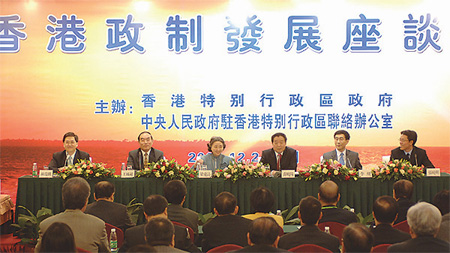Acting according to law to realize double universal suffrage in HK
Updated: 2010-04-16 08:11
(HK Edition)
|
|||||||
|
National People's Congress Standing Committee Deputy Secretary-General Qiao Xiaoyang (3rd right) attends a forum on Hong Kong's constitutional development in Shenzhen on December 2, 2005. Provided to China Daily |
Qiao's speech serves justice, complies with public opinions, abides by national laws and answers to conscience
The speech made by Qiao Xiaoyang, deputy secretary-general of the National People's Congress Standing Committee (NPCSC), Wednesday was one that served justice, complied with public opinion, abided by national laws and answered to conscience, according to a signed article penned by Li Chuan and released Thursday by China News Agency.
What follows is excerpted from Li's article:
The speech promoted the modern legal spirit of upholding procedural justice.
The meaning of "acting according to law", as recognized by the international community, refers to substantive law and procedural law. In legal terminology, it means upholding both substantive justice and procedural justice.
Comparatively speaking, the British and American legal systems put more emphasis on procedural justice than their continental counterparts, as procedural justice is a shield against autocracy.
In his Wednesday speech, Qiao invoked procedural justice when he addressed requests that the NPCSC should pledge that universal suffrage "shall be", rather than "may be", realized in the 2017 Chief Executive (CE) and 2020 Legislative Council elections.
He pointed out that when laying out the timetable for double universal suffrage back in 2007, the NPCSC also specified five steps to be taken in order to complete the legal procedure before universal suffrage could be made a reality - the SAR government submits to the NPCSC a report to initiate the amendment process for the two election methods; the NPCSC endorses the report; the SAR government presents to LegCo the bill on double universal suffrage procedures to be passed by a two-thirds majority of all legislators; the CE approves the bill; and the SAR government submits the passed bill to the NPCSC for approval or record.
The reason why "may be" is used instead of "shall be" is that the NPCSC's approval is only part of the procedure. It could not dictate the decisions of other players in the process. That is against legal procedure and the Basic Law.
Meanwhile, Qiao's speech also demonstrated the pragmatic spirit in promoting democracy.
He pointed out that in a pluralistic society like Hong Kong, it is difficult to come up with a formula that could comply with the Basic Law and NPCSC decisions on the one hand, and take into consideration the interests and aspirations of all strata and sectors of society on the other - one that may not be able to satisfy every party but is acceptable to all.
Against a backdrop of many diverging opinions in the local community today, law professor Albert Chen of the University of Hong Kong has recently put forward a very good piece of advice - "take the step when you see a foothold". What he means is that when we see a government proposal for a system more democratic than what we have, take it, or our democracy will never move forward.
What the government is proposing is a more democratic alternative to the current system, since it suggests, for example, to expand the Election Committee's membership from 800 to 1,200, to increase the number of legislators from 60 to 70, and to deny appointed District Council members the right to vote and be elected in the two elections.
Other than modern legal spirit and pragmatism, Qiao's remarks also demonstrated his modesty and broad-mindedness.
Since the law is the boundary of democracy and because the NPCSC already ruled on the principles and scope of the amendment of the two electoral methods in 2007, the government's reform package cannot incorporate all suggestions and extend beyond the NPCSC's authorization.
Yet, whatever is expressed within the bounds of law ought to be respected, in the spirit of the remark commonly attributed to Voltaire: "I disapprove of what you say, but I will defend to the death your right to say it."
Qiao said he noticed that the SAR government had collected a large number of differing opinions during the consultation exercise and put them into a report in which they are organized and summed up.
He praised the SAR government for doing this and commented that these opinions, though some of which went beyond the current administration's jurisdiction, would have significant implications for the next-term government, which would be responsible for formulating the rules for universal suffrage.
In saying this, Qiao demonstrated the broad-mindedness found in a conscientious person, which comes from his conviction that democracy is a kind of politics based on the will of the people, and that democracy means respecting the majority while protecting the minority.
The right of the people of Hong Kong to universal suffrage was not given by the British, nor has it been won by any political party. It is bestowed by the Central Government and enshrined in the Basic Law.
The timetable for the realization of universal suffrage is not sent by heaven. It was fixed by the NPCSC in 2007 according to the mainstream opinion of the people of Hong Kong.
Facts have proven that the Central Government is very supportive of democratic development in Hong Kong. The future of democracy in Hong Kong is bright, but the road is not smooth.
We hope the road to more democracy could be less bumpy and with less unnecessary sidetracking. We hope double universal suffrage could be realized without violating Hong Kong's rule of law. We hope the vetoing of the reform package in 2005 will not be replicated this time.
(HK Edition 04/16/2010 page2)
